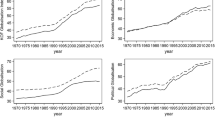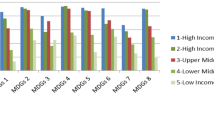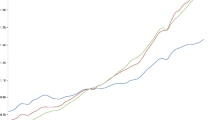Abstract
The World Happiness Index is calculated by a simple arithmetic addition of 7 sub-indicators. Such an aggregation is subject to possible compensation effects and may thus hide important information and consequently give a false impression. A posetic-based data analysis allows an evaluation of the data without any presumptions or aggregations leading to a different happiness ranking. The relative importance of the seven sub-indicators is disclosed. The most important sub-indicator appears to be the ‘Dystopia’ indicator, which reflects the countries own perception of doing better or worse than the hypothetical country Dystopia. Further, it was shown that, e.g., the gross domestic product per capita in terms of purchasing power parity plays only an inferior role. The study further elucidated so-called ‘peculiar’ countries, i.e., countries where one or more sub-indicators are either extremely high or low compared to the general trend of this indicator(s). Thus, a contradiction for Switzerland with regard to generosity compared to the CAF World Giving Index is disclosed. The effect of introducing weight regimes leading to a significantly reduced uncertainty in the average happiness ranking is discussed as is the correlations between the original happiness index ranking and the average rankings. In a final section some variations in the average ranking when changing to the data to the 2017 index are discussed.






Similar content being viewed by others
References
Bruggemann R, Annoni P (2014) Average heights in partially ordered sets. MATCH Commun Math Comput Chem 71: 117–142. http://match.pmf.kg.ac.rs/electronic_versions/Match71/n1/match71n1_117-142.pdf. Accessed Sept 2017
Bruggemann R, Carlsen L (eds) (2006a) Partial Order in Environmental sciences and chemistry. Springer, Berlin. http://www.springer.com/us/book/9783540339687. Accessed Sept 2017
Bruggemann R, Carlsen L (2006b) Introduction to partial order theory exemplified by the evaluation of sampling sites, In: Bruggemann R, Carlsen L (eds) Partial order in environmental sciences and chemistry. Springer, Berlin, pp 61–110. http://link.springer.com/chapter/10.1007/3-540-33970-1_4. Accessed Sept 2017
Bruggemann R, Carlsen L (2011) An improved estimation of averaged ranks of partially orders. MATCH Commun Math Comput Chem 65: 383–414. http://match.pmf.kg.ac.rs/electronic_versions/Match65/n2/match65n2_383-414.pdf. Accessed Sept 2017
Bruggemann R, Carlsen L (2014) Incomparable-what now? MATCH Commun Math Comput Chem 71: 694–716. http://match.pmf.kg.ac.rs/electronic_versions/Match71/n3/match71n3_699-716.pdf. Accessed Sept 2017
Bruggemann R, Patil GP (2011) Ranking and prioritization for multi-indicator systems-introduction to partial order applications. Springer, New York. http://www.springer.com/gp/book/9781441984760. Accessed Sept 2017
Brüggemann R, Halfon E, Welzl G, Voigt K, Steinberg C (2001) Applying the concept of partially ordered sets on the ranking of near-shore sediments by a battery of tests. J Chem Inf Comput Sci 41:918–925. doi:10.1021/ci000055k
Bruggemann R, Restrepo G, Voigt K, Annoni P (2013) Weighting intervals and ranking, exemplified by leaching potential of pesticides. MATCH Commun Math Comput Chem 69: 413–432. http://match.pmf.kg.ac.rs/electronic_versions/Match69/n2/match69n2_413-432.pdf. Accessed Sept 2017
Bruggemann R, Carlsen L, Voigt K, Wieland R (2014) PyHasse Software for partial order analysis. In: Bruggemann R, Carlsen L, Wittmann J (eds) Multi-indicator systems and modelling in partial order. Springer, New York, pp 389–423. http://www.springer.com/us/book/9781461482222. Accessed Sept 2017
Bruggemann R, Carlsen L, Annoni P (2017) Incomparable-what now, IV. Incomparabilities-a modeling challenge. In: Fattore M, Bruggemann R (eds) Partial Order Concepts in Applied Sciences. Springer, Cham. doi:10.1007/978-3-319-45421-4_3
Brunner E, Munzel U (2002) Nichtparametrische datenanalyse. Springer, Berlin. http://link.springer.com/book/10.1007/978-3-642-37184-4. Accessed Sept 2017
CAF (2015) GAF World Given Index 2015. https://www.cafonline.org/about-us/publications/2015-publications/world-giving-index-download. Accessed Sept 2017
Carlsen L, Bruggemann R (2013) An analysis of the ‘Failed States Index’ by partial order methodology. J Social Struc 14(3): 1–32. https://www.cmu.edu/joss/content/articles/volume14/CarlsenBruggemann.pdf. Accessed Sept 2017
Carlsen L, Bruggemann R (2014a) The ‘Failed State Index’ offers more than just a simple ranking. Soc Indic Res 115:525–530. doi:10.1007/s11205-012-9999-6
Carlsen L, Bruggemann R (2014b) Indicator analysis-what is important and for what? In: Bruggemann R, Carlsen L, Wittmann J (eds) Multi-indicator systems and modelling in partial order. Springer, New York, pp 359–387. http://www.springer.com/us/book/9781461482222. Accessed Sept 2017
Carlsen L, Bruggemann R (2017) Partial ordering and metrology. Analyzing analytical performance. In: Fattore M, Bruggemann R (eds) Partial Order Concepts in Applied Sciences. Springer, Cham. doi:10.1007/978-3-319-45421-4_4
Carlsen L, Bruggemann R, Kenessova O, Erzhigitov E (2015) Evaluation of analytical performance based on partial order methodology. Talanta 132:285–293. doi:10.1016/j.talanta.2014.09.009
Dieckmann A, Dippold K, Dietrich H (2009) Compensatory versus noncompensatory models for predicting consumer preferences, judgment and decision making, 4: 200–213. http://journal.sjdm.org/81008/jdm81008.pdf. Accessed Sept 2017
Ernesti J, Kaiser P (2008) Python-Das umfassende Handbuch. Galileo Press, Bonn. http://python.haas.homelinux.net/. Accessed Sept 2017
Guardian (2010) Charitable giving by country: who is the most generous? The Guardian, Sept. 8th. https://www.theguardian.com/news/datablog/2010/sep/08/charitable-giving-country. Accessed Sept 2017
Halfon E, Reggiani MG (1986) On ranking chemicals for environmental hazard. Environ Sci Technol 20:1173–1179. doi:10.1021/es00153a014
Hasse H (1967) Vorlesungen über Klassenkörpertheorie. Physica-Verlag, Marburg
Hauser JR, Ding M, Gaskin SP (2009) Non-compensatory (and compensatory) models of consideration-set decisions. In: Proceedings of the sawtooth software conference. http://www.mit.edu/~hauser/Papers/Hauser_Ding_Gaskin_Sawtooth_Consideration_May_02_09.pdf. Accessed Sept 2017
Helliwell JF, Huang H, Wang S (2016) The world happiness index, chapter 2: the distribution of world happiness. http://worldhappiness.report/wp-content/uploads/sites/2/2016/03/HR-V1Ch2_web.pdf. Accessed Sept 2017
Hetland ML (2005) Beginning python-from novice to professional. Apress, Berkeley. http://www.apress.com/us/book/9781590599822. Accessed Sept 2017
HI (2016) World Happiness Report 2016 (2016). In: Helliwell J, Layard R, Sachs J (eds). http://worldhappiness.report/ed/2016/. Accessed Sept 2017
HI (2017) World Happiness Report 2017. In: Helliwell J, Layard R, Sachs J (eds). http://worldhappiness.report/ed/2017/. Accessed Sept 2017
HRI (2012) Sustainable happiness. Why waste prevention may lead to an increase in quality of life. Danish Ministry of Environment. http://mst.dk/media/130530/141203-sustainable-happiness.pdf. Accessed Sept 2017
KJBO (2016) King James Bible. The preserved and living word of god, acts 20:35. http://www.kingjamesbibleonline.org/Acts-Chapter-20/. Accessed Sept 2017
Langtangen HP (2008) Python scripting for computational science. Springer, Berlin. http://www.springer.com/la/book/9783540739159. Accessed Sept 2017
Lerche D, Sørensen PB, Brüggemann R (2003) Improved estimation of ranking probabilities in partial orders using random linear extensions by approximation of the mutual ranking probability. J Chem Inf Comput Sci 43:1471–1480. doi:10.1021/ci0300036
Lyubomirsky S (2008) The how of Happiness. A new approach to getting the life you want. Penguin Press, New York. https://www.amazon.com/How-Happiness-Approach-Getting-Life/dp/0143114956. Accessed Sept 2017
Maggino F, Zumbo BD (2012) Measuring the quality of life and the construction of social indicators, in: Land KC, Michalo AC, Sirgy J (eds) Handbook of social indicators and quality of life research. Springer, Netherlands, pp 201–238. http://www.springer.com/cn/book/9789400724204. Accessed Sept 2017
McConnell AR (2010) Giving really is better than receiving. Does giving to others (vs. the self) promote happiness? Psychology Today. https://www.psychologytoday.com/blog/the-social-self/201012/giving-really-is-better-receiving
Monjardet B (1981) Metrics on partially ordered sets—a survey. Discrete Math 35:173–184. doi:10.1016/0012-365X(81)90206-5
Munda G (2008) Social multi-criteria evaluation for a sustainable economy (Operation, p. 227). Springer, New York. http://www.springer.com/us/book/9783540737025. Accessed Sept 2017
Python (2015) Python. http://www.python.org/. Accessed Sept 2017
Rich AT (2013) Honoring happiness: what Bhutan, a cowboy hat, & the economy have in common. http://www.triplepundit.com/2013/05/what-does-happiness-have-to-do-with-sustainability/. Accessed Sept 2017
Sachs JD (2015) The age of sustainable development. Columbia University Press, New York
Tänzler D, Maras K (2012) The social construction of corruption in Europe, Routledge. https://www.routledge.com/The-Social-Construction-of-Corruption-in-Europe/Tanzler-Maras/p/book/9781409402978. Accessed Sept 2017
TI (2015) Corruption perception index, transparency international. http://www.transparency.org/cpi2015#results-table. Accessed Sept 2017
TI (2016) What is corruption? Transparency international. http://www.transparency.org/what-is-corruption. Accessed Sept 2017
Topix (2010) Neighbors that copy everything you do! http://www.topix.com/forum/city/winchester-ky/TFKF1TKNM90QKRE4K. Accessed Sept 2017
Weigend M (2006) Objektorientierte programmierung mit python. mitp-Verlag, Bonn. https://www.amazon.de/Objektorientierte-Programmierung-Python-Michael-Weigend/dp/382661660X. Accessed Sept 2017
Zar JH (1999) Biostatistical analysis, 4th edn. Prentice Hall, Upper Saddle River
Author information
Authors and Affiliations
Corresponding author
Additional information
Handled by Alexander Gonzalez Flor, University of the Philippines Open University, Philippines.
Rights and permissions
About this article
Cite this article
Carlsen, L. Happiness as a sustainability factor. The world happiness index: a posetic-based data analysis. Sustain Sci 13, 549–571 (2018). https://doi.org/10.1007/s11625-017-0482-9
Received:
Accepted:
Published:
Issue Date:
DOI: https://doi.org/10.1007/s11625-017-0482-9




